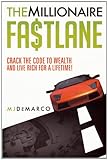![E-myth Revisited: Why Most Small Businesses Don't Work and What to Do About It [Paperback] E-myth Revisited: Why Most Small Businesses Don't Work and What to Do About It [Paperback]](http://1.2.3.11/bmi/ecx.images-amazon.com/images/I/41EzHt1vpvL._SL160_.jpg) The E-myth revisited is a book I've been meaning to read for a while now. The E in E-myth stands for entrepreneur rather than electronic as you might guessed.
The E-myth revisited is a book I've been meaning to read for a while now. The E in E-myth stands for entrepreneur rather than electronic as you might guessed.The author - Michael Gerber - starts with with some grim facts. Rather than being the way to the American dream - most small businesses fail or turn into a job ie the business ends up owning you rather than vice versa. It's hard to dispute these - the small businessman who works all hours in a corner shop or launderette is almost an archetype.
But does he offer any real solutions? The answer is yes - but only at a fairly superficial level. Basically, you can sum up his philosophy like so: professionalise your business from the outset. It's great advice but not something unknown to me although perhaps very useful for a new business owner or one trapped in the archetypical corner shop desperate to get out.
He pays particular attention to the franchise model and suggests you follow their model of operation. So do to this you should describe all of the various roles in the company before you start up (even if you are the only one filling them!) and create documented systems incorporating as much automation as possible. There is also some good advice around handling your first employees (delegation rather than abdication). All - perhaps uncommon - commonsense but very short on specifics.
One last thing, the book is mostly related as a conversation between Michael and a local baker he is helping out. This adds a great deal of charm and makes it easy to take in the learning. It's a fairy tale for small but struggling business peeps everywhere.

